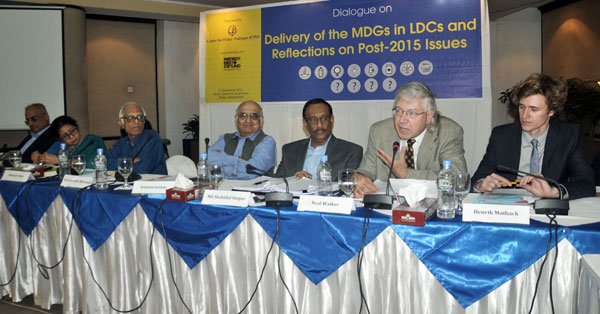
The Asian least developed countries (LDCs) performed better than their African and Island LDC counterparts in social and human development indicators in the Millennium Development Goal (MDG) index, revealed a CPD study on the LDCs’ success in attaining the MDGs.
Bangladesh and Cambodia performed best among the 49 LDCs, according to the study, which also underpinned lack of good governance, accountability, access to resources, and falling foreign aid as the factors influencing poor performance of other LDC countries.
The study recommended the post-MDG framework to emphasise on employment generation, poverty reduction, quality education, human rights and lessening inequalities between urban and rural population.
The observations surfaced at a dialogue titled “Delivery of the MDGs in LDCs and Reflections on Post-2015 Issues” on the CPD study titled “Attaining the MDGs: How Successful are the LDCs?” on Saturday, 21 September 2013. Friedrich-Ebert-Stiftung (FES) co-organised the dialogue, chaired by Professor Rehman Sobhan, at BRAC Centre Inn Auditorium.
Dr Debapriya Bhattacharya, Distinguished Fellow, CPD presented the study that discussed the economic performance of the LDCs since the launch of MDGs, reviewed different approaches and methods applied in tracking movements towards achieving the MDGs.
“Bangladesh lies in the area along with ‘countries not accelerated, but on track’,” cites the report. The study also found that Bangladesh has achieved most of the MDG targets but was still lagging behind in areas such as adult literacy, creation of decent wage employment, employment generation, income inequality, primary school completion rate, hunger and poverty reduction and low economic participation of women. The country has also remained off-track in the two areas since the 1990s – proportion of land area covered by forests and employment to population ratio.
As distinguished guests and panellists, Professor Wahiduddin Mahmud, former Advisor to the caretaker government and Member, the UN Committee for Development Policy (CDP); Mr M Syeduzzaman, former Finance Minister; Md Shahidul Haque, Secretary at the Ministry of Foreign Affairs; Mr Neal Walker, UN Resident Coordinator and UNDP Resident Representative; Mr Henrik Maihack, Resident Representative at FES Bangladesh Office; Ms Rasheda K Choudhury, Executive Director, CAMPE and former Advisor to the Caretaker Government; Dr Shamsul Alam, Member, Planning Commission, Government of Bangladesh addressed the dialogue among others.
[box title=”Download the Study“]
